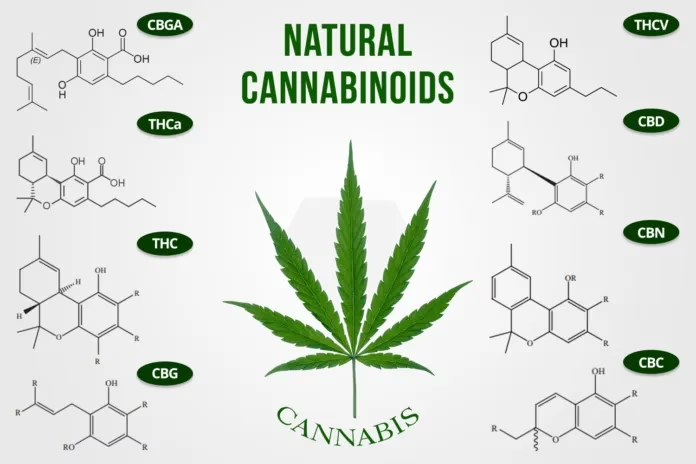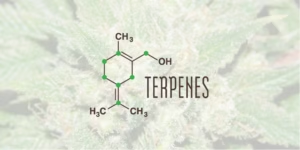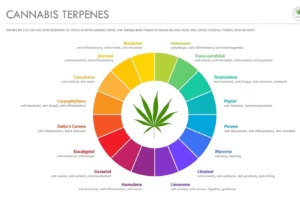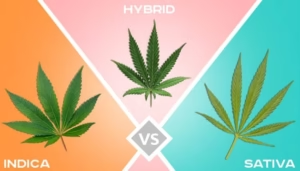Cannabis contains over 100 different compounds called cannabinoids, each offering unique effects and benefits. If you’re exploring the world of cannabis, whether as a new or experienced user, understanding these compounds is key to making informed choices about which products will work best for you.
This guide breaks down the most important cannabinoids you’ll encounter, explaining how THC creates its characteristic effects, why CBD has become a wellness staple, and how minor cannabinoids like CBN can target specific needs like sleep support.
Understanding the Cannabis Plant’s Chemical Makeup
How Cannabinoids Interact with Your Body’s Endocannabinoid System
Your body contains a complex regulatory network called the endocannabinoid system (ECS), which works to maintain balance in processes like mood, sleep, appetite, and pain response. This system consists of cannabinoid receptors (CB1 and CB2), endocannabinoids that your body produces naturally, and enzymes that break them down.
When you consume cannabis, plant-derived cannabinoids interact with this system. THC binds directly to CB1 receptors in the brain, producing psychoactive effects. CBD influences the system more indirectly, often modulating how other compounds interact with receptors and supporting your body’s natural endocannabinoid levels.
The Difference Between Major and Minor Cannabinoids
Cannabinoids are categorized based on their typical concentration in the plant:
- Major cannabinoids like THC and CBD appear in significant amounts (often 10-30%).
- Minor cannabinoids like CBN, CBG, and THCV usually occur in smaller quantities (under 1-3%) but offer distinct benefits.
The Entourage Effect: How Cannabinoids Work Together
The “entourage effect” describes how cannabis compounds work synergistically—together, they produce effects that are greater than the sum of their parts. Full-spectrum products, which contain multiple cannabinoids and terpenes, are often preferred for this reason, as they leverage the plant’s natural chemical profile.
THC: The Psychoactive Powerhouse
How THC Creates Effects and Its Medical Benefits
THC (tetrahydrocannabinol) is the primary psychoactive compound in cannabis. It binds to CB1 receptors in the brain, altering the release of neurotransmitters and producing feelings of euphoria, relaxation, and altered sensory perception.
Beyond its recreational use, THC offers several evidence-based benefits:
- Pain relief, particularly for chronic and neuropathic pain
- Nausea and vomiting reduction, especially for patients undergoing chemotherapy
- Appetite stimulation, helpful for conditions like HIV/AIDS or cancer
- Muscle spasticity reduction in conditions like multiple sclerosis
Understanding THC Potency and Consumption Methods
THC potency varies widely across products. Flower might contain 15-30% THC, while concentrates can exceed 80%. For new users, low-dose options like gummies or tinctures offer a controlled introduction.
Our selection includes various THC products suited to different preferences:
- Vape cartridges for fast-acting effects
- Pre-rolls for traditional consumption
- Edibles like chocolate and gummies for longer-lasting effects
CBD: The Non-Intoxicating Wellness Champion
Why CBD Doesn’t Cause a High but Offers Therapeutic Benefits
CBD (cannabidiol) is non-psychoactive, meaning it won’t produce the “high” associated with THC. Instead, it offers therapeutic benefits by interacting with various receptor systems in the body, including serotonin receptors that regulate mood and pain perception.
Proven Benefits and Product Types
Research supports CBD’s effectiveness for:
- Anxiety reduction through modulation of serotonin signaling
- Inflammation reduction via interaction with immune cells
- Seizure management, with FDA-approved medications for certain epilepsy types
At Majestic Greens DMV, we offer multiple CBD options:
- CBD-rich flower strains
- Broad-spectrum CBD products without THC
- Full-spectrum products with trace THC for enhanced effects
CBN: The Sleep-Promoting Cannabinoid
How CBN Forms and Its Benefits
CBN (cannabinol) is a minor cannabinoid that develops as THC ages and breaks down. Known for its sedative properties, CBN has gained popularity as a natural sleep aid.
Research suggests CBN may:
- Promote relaxation and sleep
- Act as a mild analgesic (pain reliever)
- Work synergistically with THC for enhanced effects
Finding CBN Products for Nighttime Use
While pure CBN products are still relatively uncommon, many cannabis strains and products contain varying levels of this cannabinoid. Our evening-use products often feature higher CBN content, particularly those labeled as good for sleep or relaxation.
Other Notable Cannabinoids
CBG: The “Mother Cannabinoid”
CBG (cannabigerol) is often called the “mother cannabinoid” because other cannabinoids derive from its acidic form. Early research suggests potential benefits for:
- Glaucoma (reducing intraocular pressure)
- Inflammatory bowel disease
- Antibacterial applications
THCV: The “Diet Coke” of Cannabinoids
THCV (tetrahydrocannabivarin) offers effects that contrast with THC:
- Appetite suppression (rather than stimulation)
- Potential help regulating blood sugar levels
- Shorter, more clear-headed psychoactive effects at higher doses
Choosing the Right Cannabinoid Products for Your Needs
Matching Products to Your Goals
Consider these general guidelines when selecting products:
- Pain relief: Balanced THC:CBD ratios (1:1)
- Sleep support: Higher CBN content, indica-leaning strains
- Daytime use: Lower THC, higher CBD or THCV options
- Creativity/focus: Sativa-leaning strains with pinene or limonene terpenes
Understanding Product Labels and Testing
Reputable dispensaries provide third-party lab testing results that show:
- Cannabinoid percentages (THC, CBD, etc.)
- Terpene profiles
- Contaminant screening (pesticides, heavy metals)
All products at our DC dispensary include this testing information to ensure quality and safety.
Consumption Methods and Onset Times
Different consumption methods affect how quickly you feel effects and how long they last:
- Inhalation (smoking/vaping): Effects in minutes, duration 1-3 hours
- Oral (edibles, tinctures): Effects in 30-90 minutes, duration 4-8 hours
- Topical (creams, balms): Localized effects, minimal systemic absorption
Conclusion: Finding Your Ideal Cannabinoid Profile
The world of cannabinoids offers diverse options for both recreational enjoyment and therapeutic support. Whether you’re seeking the psychoactive effects of THC, the non-intoxicating benefits of CBD, or the sleep-supporting properties of CBN, understanding these compounds helps you make informed choices.
At Majestic Greens DMV, we’re committed to helping you find the right products for your needs. Our knowledgeable staff can guide you through our selection of flowers, concentrates, edibles, and vape products to find your ideal cannabinoid profile.
Visit our online menu to explore our current selection, or stop by our DC dispensary to speak with one of our cannabis consultants about finding the right products for your needs.
Frequently Asked Questions
Q: What’s the difference between CBD and THC?
A: THC is psychoactive and produces a “high,” while CBD is non-psychoactive and offers therapeutic benefits without intoxication.
Q: How do I choose between sativa and indica strains?
A: Generally, sativa strains are more energizing, while indica strains are more relaxing. However, individual cannabinoid and terpene profiles matter more than this broad classification.
Q: Will CBD show up on a drug test?
A: Pure CBD shouldn’t trigger a positive result, but full-spectrum products containing trace THC might. If drug testing is a concern, choose broad-spectrum or isolate products.
Q: How long do edibles take to work?
A: Edibles typically take 30-90 minutes to produce effects, which can last 4-8 hours. Start with a low dose (2.5-5mg THC) and wait at least 2 hours before consuming more.
Q: What’s the best cannabinoid for sleep?
A: CBN is particularly known for supporting sleep, often combined with THC. Indica-leaning strains with myrcene terpenes also promote relaxation.




